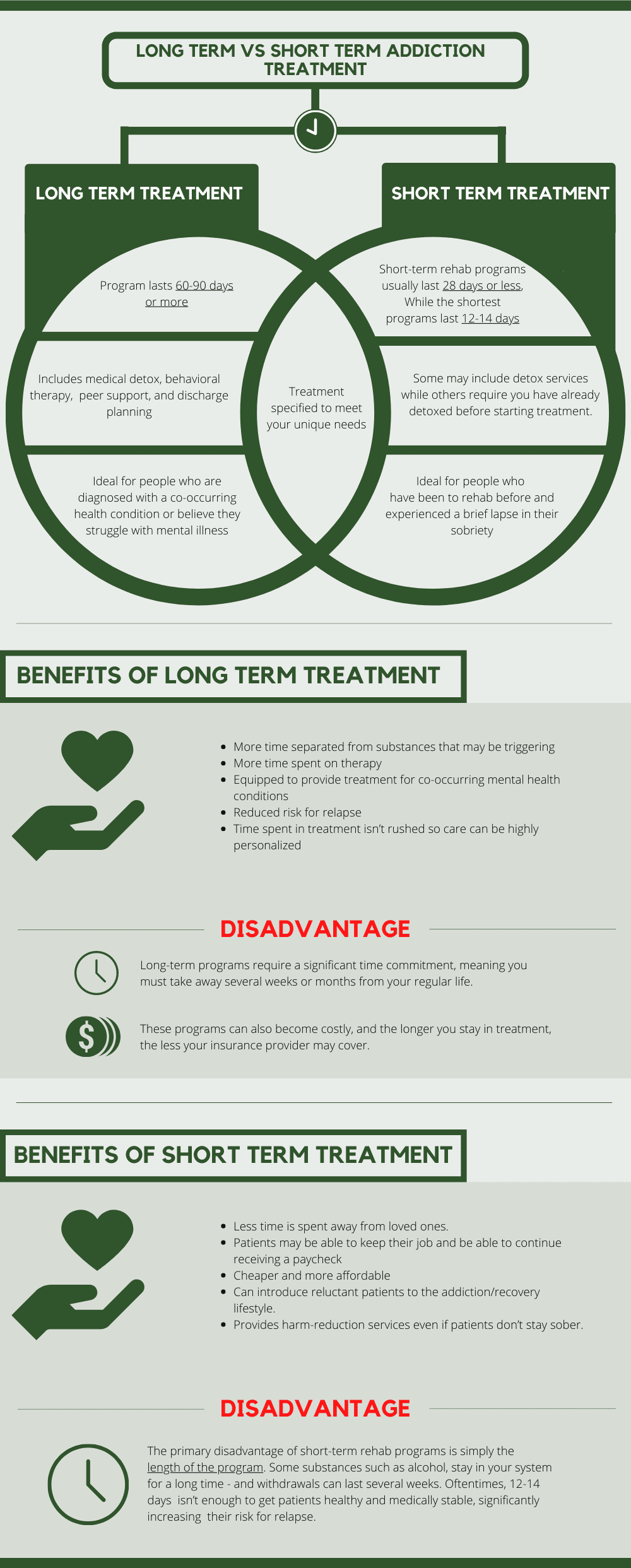According to the National Institute on Drug Abuse’s Principles of Effective Treatment, most addicted individuals need at least 90 days in rehab to significantly reduce or stop their substance abuse. Research also suggests the best treatment outcomes tend to occur with longer treatment programs.[1] However, no two individuals are the same, so no two people have the same exact treatment needs. Some people have very serious addictions and mental health conditions that simply aren’t treatable on a short-term basis. Others have very mild addictions and supportive home environments, so they may not need as long of a treatment program or as intensive care.
If you or a loved one have begun your search for the right rehab center in Massachusetts, you have many difficult decisions ahead of you to make. One of these decisions may be how long you or your loved one should stay in rehab or what length of program you should choose. While most rehab programs last 30, 60, or 90 days, there are also 12-day rehab programs available in the Boston area.
Of course, 12 days of rehab seems way more appealing than a three-month commitment, but are 12 days of rehab enough for you to get prepared for a lifetime of sobriety?
The answer isn’t always simple. It often depends on the severity of your addiction, your personal treatment needs, and your goals in rehab and recovery. By comparing your needs with the benefits of short-term rehab and long-term rehab, you can decide whether or not 12 days in rehab is right for you.

Benefits of Long Term Addiction Treatment
When referring to long-term rehab, it generally means 60-90 days or more. These programs usually include medical detox, behavioral therapy, peer support, and discharge planning. There are many benefits to attending a long-term rehab program in Massachusetts, such as:
- More time separated from drugs, alcohol, and people, places, or things that may be triggering
- Increased hours spent in therapy can help reinforce new coping skills
- Long-term programs are equipped to provide treatment for co-occurring mental health conditions
- Reduced risk for relapse after completion of the program
- Time spent in treatment isn’t rushed so care can be highly personalized
Disadvantages to Consider
The Family and Medical Leave Act (FMLA) was signed into law by President Bill Clinton in 1993. It gives qualifying employees up to 12 weeks of unpaid leave each year. Most public and private employers with over 50 employees are subject to FMLA, including public, private, and school institutions. You may qualify for FMLA if:
The Ideal Candidate for Long Term Rehab
Virtually anyone can benefit from an extended stay at a drug and alcohol rehab center in Massachusetts. Taking your time in treatment will allow you to truly grasp the recovery concepts you need to utilize for sustained sobriety. With that being said, there are certain individuals who are the perfect candidate for long-term treatment, and those who should stray away from short-term programs. These are people who:
- Are diagnosed with a co-occurring health condition or believe they struggle with mental illness
- Have been addicted for several years or are considered “chronic” users
- Are in need of medical care and supervision
- Have experienced several relapses in the past after short-term programs

Get The Care You Need and Deserve
Woburn Addiction Treatment is a leader in the addiction treatment field, with proven success in facilitating long-term recovery. Our team of top clinical & medical experts specializes in treating addiction coupled with mental illness, ensuring that each person receives individualized care. Call us – we’re available 24/day, 7 days/week.
Benefits of Short Term Rehab
Short-term rehab programs usually last 28 days or less, with the shortest programs being 12-14 days. Some may include detox services while others require you have already detoxed before starting treatment. While long-term rehab is generally preferred, there are many advantages to short term rehab programs in the Boston area, including:
- Less time is spent away from family, friends, children, and loved ones
- Patients may be able to keep their job and use PTO or vacation days to continue receiving a paycheck
- Shorter addiction treatment programs are cheaper and more affordable
- Patients can be referred to a long term program or their treatment program can be extended (if needed)
- Can introduce reluctant patients to the addiction/recovery lifestyle
- May be able to provide harm-reduction services even if patients don’t stay sober (such as educating patients about the importance of using clean needles or keeping Narcan closeby)
Drawbacks of Shorter Programs
The primary disadvantage of short-term rehab programs is simply the length of the program. In some cases, treatment may feel rushed as there isn’t as much time to focus on addressing and treating underlying issues. Co-occurring mental health conditions may be overlooked or not treated to their full extent. Additionally, some substances, such as alcohol, stay in your system for a long time – and withdrawals can last several weeks. Oftentimes, 12-14 days isn’t enough to get patients healthy and medically stable, significantly increasing their risk for relapse.
Who Qualifies for Short Term Addiction Treatment?
Short-term rehab programs usually last 28 days or less, with the shortest programs being 12-14 days. Some may include detox services while others require you have already detoxed before starting treatment. While long-term rehab is generally preferred, there are many advantages to short term rehab programs in the Boston area, including:
- Have been to rehab before and experienced a brief lapse in their sobriety
- Struggle with mild substance use disorder and have a plan for outpatient care
- Feel as though they are about to relapse and need a stabilization program
- Are reluctant to attend a long-term treatment program
- Do not need medical care and do not have a co-occurring disorder
Figuring Out If 12-Day Rehab in Massachusetts is Right For You
In the end, the only way to determine if a 12-day rehab program is right for you is to speak with a trusted addiction specialist. Here at Woburn Addiction Treatment, we believe that each individual has a right to a personalized treatment program that addresses their unique needs. We won’t treat you like just a number – we’ll learn about your underlying conditions, your treatment needs, and your recovery goals to recommend an effective program for you.
To learn more about our addiction treatment options in the Boston area or to begin your recovery journey, give us a call today.


